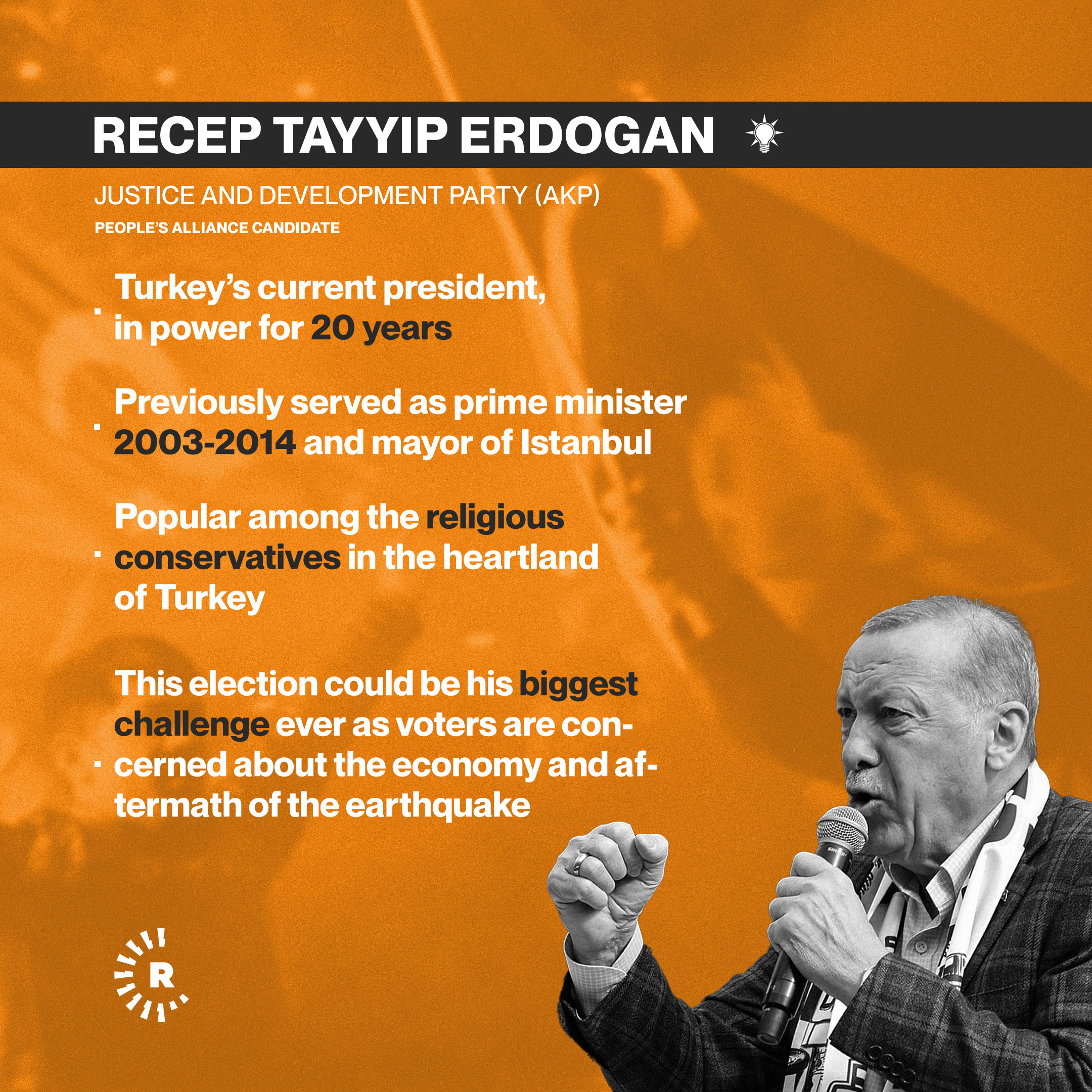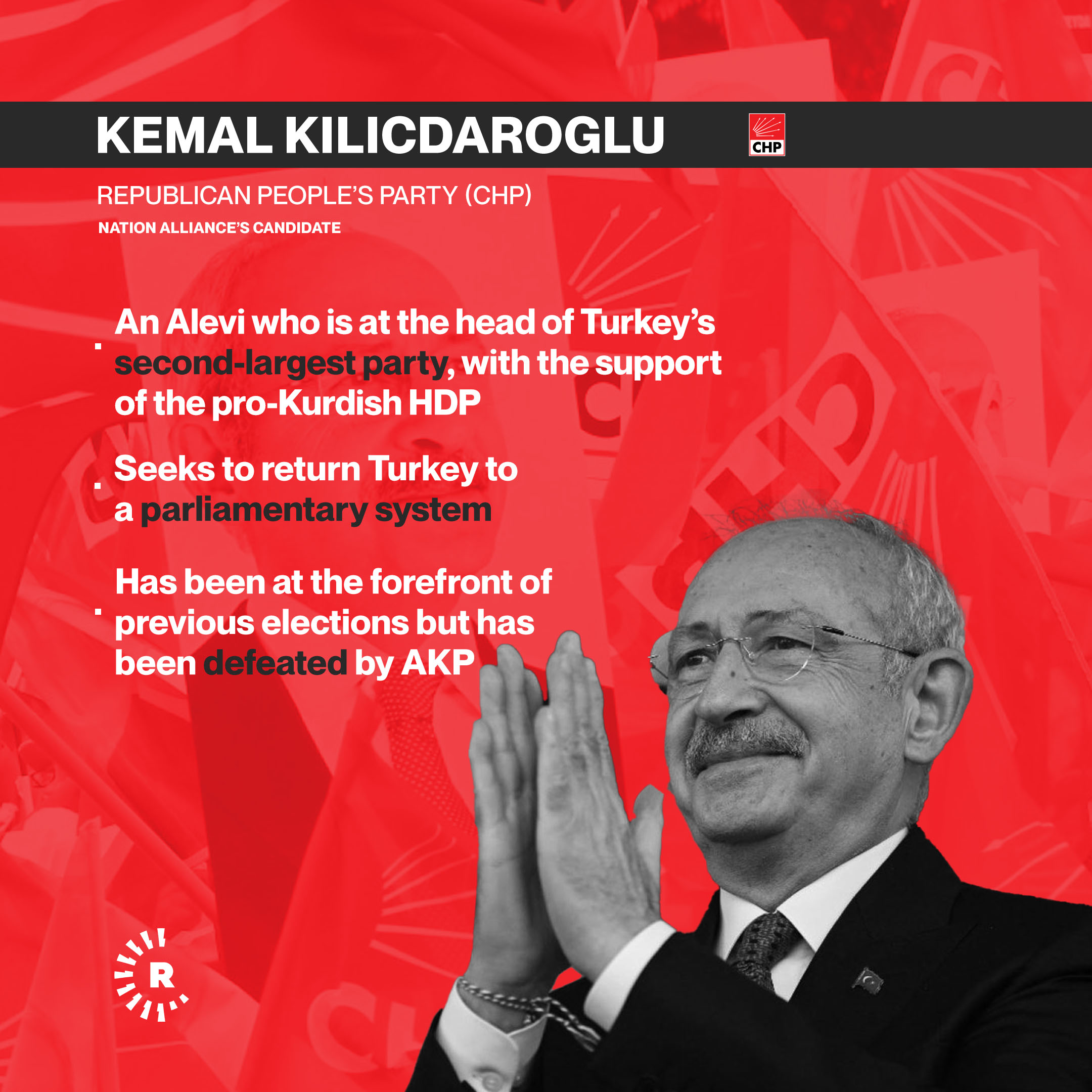
Turkish presidential candidates Kemal Kilicdaroglu (left) and Recep Tayyip Erdogan. Photos: AFP; Graphic: Aland Qaradaxi/Rudaw
Turkey will hold presidential and parliamentary elections on May 14 - a vote seen as the most important in years and of great international significance.
The polls will test the strength of President Recep Tayyip Erdogan’s two-decade rule which began on a positive note with reforms but has recently been linked to a devastating economic crisis, expected to be a decisive factor in the results. Kemal Kilicdaroglu, an Alevi from the Kurdish city of Dersim, is leading a collective effort by several opposition parties to unseat the incumbent president.
On Thursday, Muharrem Ince withdrew from the presidential race. Experts viewed him as a third party candidate who could drive away support from Kilicdaroglu, boosting Erdogan’s chance at a win. However, the opposite is now expected to happen as Ince used to be a member of the same party Kilicdaroglu is running for.
Here is what you need to know about the key presidential candidates and political parties ahead of Election Day:
ELECTORAL SYSTEM:
Erdogan, the head of the party, became the prime minister of Turkey in 2003 and remained in the position until 2014 when he became the president of the country - a ceremonial position at the time. He changed the country’s governing system from parliamentary to presidential through a referendum. This created a one-man rule in the country as it abolished the role of the prime minister.
In order for a candidate to secure the position, at least 50% of the presidential vote is needed. If no candidate succeeds to do so, the top two candidates will go head to head in a second vote two weeks later. In this case, it would take place on May 28.
In addition to picking a president, 600 members of the Turkish parliament will also be voted through a system of proportional representation. In order to obtain a majority in parliament, a party must win over 50 percent of the votes.
WHO IS WHO?
Justice and Development Party
Justice and Development Party (AKP or AK Parti) is a political party with Islamic roots. It was founded in 2001, winning a sweeping victory in the national elections the following year - mainly due to the criticism of the then-government following a devastating quake that killed some 17,000 in the northwest of the country in 1999. The party has won most of the votes in all elections since then.
The AKP started its rule with reforms, particularly in the economic field, and provided Kurds with rights which were seen as taboo throughout the previous century such as the right to speak their mother tongue in public places, as well as introducing elective Kurdish courses at schools.

The AKP government started talks with the Kurdistan Workers’ Party (PKK) - a Kurdish armed group claiming to fight for the cultural and political rights of Kurds in Turkey but designated as a terrorist organization by Ankara - and both announced a short-lived ceasefire in 2013. Most of the votes of Kurdish areas in southeast Turkey (known by Kurds as Northern Kurdistan or Bakur) have been divided between the AKP and pro-Kurdish parties in the last two decades.
The popularity of Erdogan and his party has been falling since 2015 when it failed to secure an overall majority due to the major success of the pro-Kurdish Peoples’ Democratic Party (HDP). The AKP formed an alliance with the far-right Nationalist Movement Party (MHP) after a rerun vote the same year in order to be able to form a cabinet. MHP is not officially in the government but supports it and has a profound impact on its decisions.
AKP gained 295 seats and MHP won 49 in the 600-seat parliament in 2018.
Republican People’s Party
CHP is the oldest Turkish party and its first leader, Mustafa Kemal Ataturk, is the founder of modern Turkey. The party has struck an alliance with five other opposition parties, known as the Table of Six or Nation Alliance, in a bid to unseat Erdogan and restore the parliamentary system.
The party has been led by Kilicdaroglu since 2010 when its then-leader Deniz Baykal resigned over a scandal. The 74-year-old politician has transformed the party from being a hardline Kemalist one to consisting mainly of pro-West politicians, including Kurds.

The party had been defeated by AKP in all elections until the 2019 local elections when the CHP took key metropolises like Istanbul and Ankara from their control. This emboldened Kilicdaroglu who later decided to use the country’s numerous crises and the anger of people at the government’s late response to February’s deadly quakes, in order to race against Erdogan in Sunday’s elections.
CHP is the largest opposition party and has come second in most of the elections in the past decades. The party gained 146 seats in the latest general elections in 2018. In the same vote, the party fielded Muharrem Ince for the presidential position but only gained 30 percent of the votes. Erdogan won the bid.
Kilicdaroglu and his party seek the votes of Kurds who have mostly supported AKP and HDP in the last two decades. The opposition’s presidential candidate has made several trips to the Kurdish areas of Turkey recently, promising to resolve the Kurdish issue in the parliament.
.jpg)
Peoples’ Democratic Party
HDP is the main pro-Kurdish political party in Turkey. It was founded in 2012. With a diverse group of candidates ranging from devout Muslims, to minority representatives, socialists, and LGBT activists, the party passed the 10 percent vote threshold and entered parliament in 2015.
The HDP was formed by members of the Democratic Regions Party (DBP) and is seen as the successor of the Democratic Society Party (DTP), which was founded in 2005 but was closed by the Turkish Constitutional Court in 2009 for allegedly trying to divide Turkey.
Several Turkish officials have accused the HDP of being the political wing of the PKK but the party has denied the claim. In 2021, Turkey’s chief prosecutor filed a lawsuit in the Constitutional Court seeking the dissolution of the HDP for alleged links to the PKK. To avoid a potential political ban, the pro-Kurdish party in March decided to field candidates for the upcoming parliamentary election through an alternative party - Green Left Party - which was established in recent years.
The HDP acted as an intermediary during the peace process between the Turkish state and the PKK between 2013 and 2015, marking short years of hope that the decades-long conflict that left tens of thousands dead might finally come to an end.
However, the party has been subject to intense crackdowns since the failure of the peace process. Its former co-chairs Selahattin Demirtas and Figen Yuksekdag have been jailed for terror-related charges since 2016. HDP fielded Demirtas in the 2014 and 2018 presidential elections, gaining less than 10 percent of the vote both times.
HDP has formed the Labor and Freedom Alliance with a number of leftist parties. The alliance has decided not to field any candidates for the upcoming presidential elections, throwing their support to Kilicdaroglu following a meeting between them. It is not clear what was discussed during the meeting.
The CHP and Kilicdaroglu avoid acknowledging HDP’s support for him to avoid angering Turkish nationalist voters.
Nationalist Movement Party
MHP is an ultranationalist and a de facto ruling party which relies on hardline nationalist voters. It used to be an opposition party, even fielding a joint presidential candidate, Ekmeleddin Ihsanoglu, with CHP and supported by several other opposition parties, in the 2014 election. Erdogan beat the candidate.
The MHP has maintained its alliance with the AKP for the May 14 elections, supporting the re-election of Erdogan.
The leader of the far-right party is the 75-year-old Devlet Bahceli.
IYI Party
Founded by a group of politicians who defected from the MHP in 2017, IYI Party is the second largest member of the Nation Alliance. The party leader Meral Aksener, a former minister, briefly withdrew from the alliance in March after it picked Kilicdaroglu as their presidential candidate.
The nationalist politician returned to the alliance and backed Kilicdaroglu following public anger. She recommended that one of the mayors of Istanbul or Ankara who beat Erdogan’s mayoral candidates in 2019 should race against the Turkish president in the presidential contest. Kilicdaroglu agreed to give both mayors top positions if he wins.
.jpg)
.jpg)
.jpg)









Comments
Rudaw moderates all comments submitted on our website. We welcome comments which are relevant to the article and encourage further discussion about the issues that matter to you. We also welcome constructive criticism about Rudaw.
To be approved for publication, however, your comments must meet our community guidelines.
We will not tolerate the following: profanity, threats, personal attacks, vulgarity, abuse (such as sexism, racism, homophobia or xenophobia), or commercial or personal promotion.
Comments that do not meet our guidelines will be rejected. Comments are not edited – they are either approved or rejected.
Post a comment